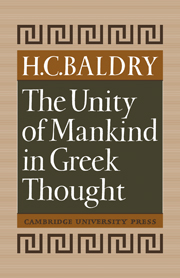Summary
THE HOMERIC PATTERN
TheIliad and Odyssey are still our earliest sources of information on Greek thought about man. It is true that archaeological discoveries and the decipherment of Linear B tablets have now enabled us to form an increasingly detailed picture of Minoan and Mycenaean civilisation, including some conception of the actual relationships and divisions which existed within society perhaps as early as 1500 B.C. But so far nothing has come to light from which we can discover what ideas these pre-Homeric Greeks held on the human race and its place in the scheme of things. This can be learned only from literature, and therefore-until some fresh discovery changes the situation- from the rich store of evidence that the Iliad and Odyssey contain.
A remarkable feature of the Homeric picture of mankind is its uniformity. I do not mean, of course, that there is any lack of individual variety among the people of the two epics, or that everyone is on the same level in the society which they portray. The picture is uniform-more so, indeed, than most that we find in later Greek literature-in the sense that it depicts a single pattern within which all, or almost all, human beings have a place. There is no explicit statement of this unity in either poem; but as an unconscious assumption it is present throughout both, and provides a basis for that deep understanding of the common human lot which gives them much of their greatness.
- Type
- Chapter
- Information
- The Unity of Mankind in Greek Thought , pp. 8 - 51Publisher: Cambridge University PressPrint publication year: 1965

